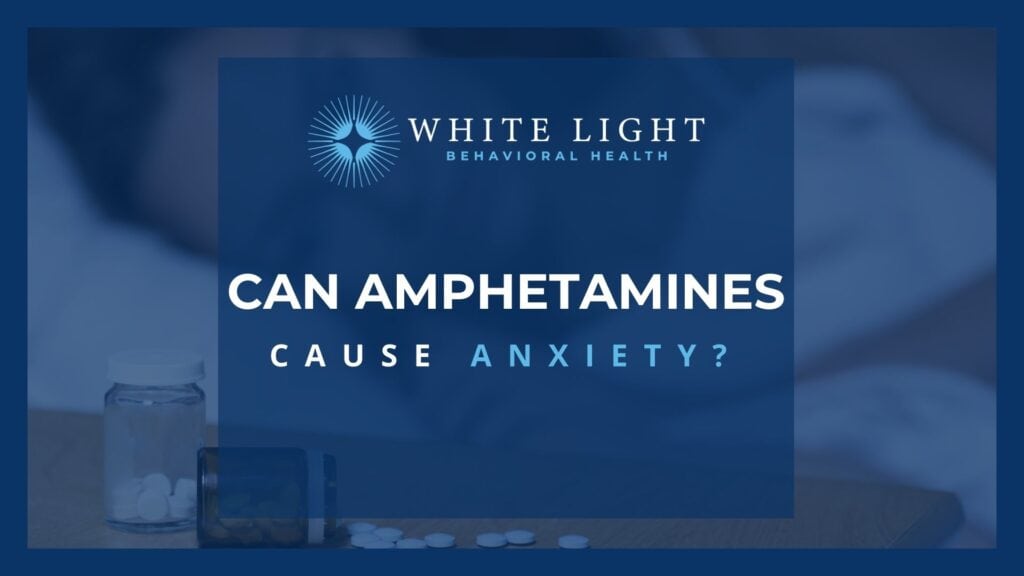Can Amphetamines Cause Anxiety?
Amphetamines are stimulants commonly prescribed to treat attention deficit hyperactivity disorder (ADHD) and narcolepsy. They work by increasing the levels of certain chemicals in the brain, resulting in improved focus, alertness, and wakefulness. While amphetamines can be beneficial for medical purposes when used as prescribed, they also have the potential for abuse and can lead to various side effects. One of the potential side effects of amphetamine use is anxiety.
Understanding Anxiety
Anxiety is a common mental health condition characterized by persistent feelings of fear, worry, and apprehension. It can manifest as physical symptoms, such as increased heart rate, sweating, and trembling, as well as cognitive symptoms, such as racing thoughts and excessive worry. Anxiety disorders can significantly impact a person’s quality of life, interfering with daily activities and relationships.
Stimulant Effects
Amphetamines are known for their stimulant properties. They increase the release of neurotransmitters, particularly dopamine and norepinephrine, in the brain. Dopamine is associated with pleasure, reward, and motivation while norepinephrine is involved in the body’s stress response and regulation of mood. The increased levels of these neurotransmitters can enhance focus, attention, and energy levels, which is why amphetamines are commonly prescribed for conditions like ADHD.
However, the stimulant effects of amphetamines can also lead to heightened anxiety levels in some individuals. Increased levels of norepinephrine, in particular, can activate the body’s stress response, resulting in feelings of restlessness, unease, and heightened arousal. This can manifest as anxiety symptoms, such as fear, racing thoughts, and increased heart rate.
Neurochemical Imbalance
Prolonged use or abuse of amphetamines can disrupt the natural balance of neurotransmitters in the brain. When amphetamines are consistently present in the system, the brain adjusts to the increased levels of dopamine and norepinephrine. Over time, the brain may depend on the drug to maintain these elevated levels.
When amphetamine use is discontinued or reduced, the brain may struggle to regulate neurotransmitter levels independently, leading to a neurochemical imbalance. This imbalance can contribute to the development of anxiety symptoms. The brain, accustomed to functioning with artificially increased neurotransmitter levels, may have difficulty restoring the natural balance, resulting in heightened anxiety.
Withdrawal Symptoms
Abruptly stopping or significantly reducing the dosage of amphetamines can trigger withdrawal symptoms. These symptoms occur as the brain adapts to functioning without the presence of the drug. Anxiety is a common withdrawal symptom experienced by individuals with a physiological dependence on amphetamines.
During withdrawal, the brain undergoes a period of adjustment to restore its natural neurotransmitter balance. This adjustment can lead to various symptoms, including anxiety and depression. The anxiety experienced during amphetamine withdrawal can result from the brain’s attempt to restore normal neurotransmitter levels and regulate mood without the drug’s artificial stimulation.
Signs of Amphetamine Abuse and Its Impact on Anxiety
Amphetamine abuse can have significant physical and psychological effects on individuals, including developing or exacerbating anxiety symptoms. Recognizing the signs of amphetamine abuse is crucial in identifying potential anxiety-related issues. Here are some signs of amphetamine abuse and its impact on anxiety.
Consumption Methods and Signs
Prescription amphetamines are typically available in pill form for oral ingestion. However, users may resort to alternative methods to achieve a more intense high. These methods can leave behind distinctive signs.
Addicts may crush amphetamine pills and snort them through tools like straws or tightly rolled pieces of paper like money. Frequent bloody noses can be a sign of snorting drug use, and if you see straws that have been cut up in someone’s home, they could be abusing amphetamines. Also, someone snorting amphetamines will need a clean, flat surface to snort them off, so look for mirrors or table tops that are covered in fine dust.
Dissolving crushed pills into a liquid allows users to inject them using syringes. Some illegal methamphetamines come in powder form that can be injected. Evidence of injection includes mixing materials like cups or drink lids; needles for injecting the drug; rubber hoses, belts, and cords to tie off veins; and needle marks at injection sites.
People who smoke amphetamines often use glass pipes or melt the drugs using metal spoons. Dark burn marks on the bottom of spoons and the smell of amphetamine smoke can indicate smoking-related amphetamine use.
Physical Symptoms of Amphetamine Abuse
Amphetamines can have profound physical effects on the body, some of which may contribute to or worsen anxiety symptoms. Amphetamine use can result in bursts of extreme, unexplained energy lasting for several hours. This energy surge is typically followed by an energy crash as the drug’s effects wear off.
Amphetamines accelerate bodily processes controlled by the central nervous system, including heart rate and breathing. Consequently, individuals may experience a noticeably faster heart rate and breathing after using the drug. The heightened brain activity caused by amphetamines can make it difficult for individuals to achieve restful sleep, leading to insomnia.
Amphetamines are dehydrating, and large doses can cause dehydration-related symptoms such as headaches and dry mouth.
Excessive energy levels can manifest as restlessness, including constant leg shaking, physical tremors, repetitive itching and scratching, and jaw clenching or teeth grinding. Because of the increased dopamine levels, amphetamine abuse may increase sex drive.
Long-term Effects of Amphetamine Abuse and Anxiety
Extended amphetamine abuse can lead to severe physical and psychological problems, including addiction. The tolerance that develops with prolonged use requires higher doses to achieve the desired effects,. Dependency and addiction can heighten anxiety symptoms and lead to chronic health issues.
Long-term amphetamine abuse can also contribute to physical ailments, such as:
• Extreme weight loss
• Chronic insomnia
• Kidney complications
• Lung problems
• Increased risk of cardiovascular issues
• Possible increased risk of dopamine-related disorders
• Increased risk of needle-related infections
• Vertigo
• Ulcers
• Skin problems, such as acne and infection from scratching
• High body temperature and heat injury
• Inability to experience pleasure from other sources
Psychological problems associated with long-term amphetamine abuse include:
• Decreased cognitive abilities
• Difficulty concentrating
• Anxiety
• Paranoia
• Amphetamine-induced depressive disorder
• Psychosis
• Behavioral disorders
Treatment Options for Amphetamine Abuse and Anxiety
When addressing amphetamine abuse and co-occurring anxiety, a comprehensive treatment approach is essential. Effective treatment addresses the physical, psychological, and social aspects of the individual’s well-being. At White Light Behavioral Center, we offer cutting-edge treatments to individuals struggling with amphetamine abuse and anxiety. Here are just a few.
Detoxification
The initial step in treatment is often detoxification, where the individual stops using amphetamines under medical supervision. This process allows the body to eliminate the substance while managing withdrawal symptoms. Medical professionals may provide medications to alleviate discomfort and ensure a safe detoxification process.
Inpatient Rehabilitation
Inpatient rehabilitation programs offer a structured environment where individuals receive intensive treatment and support. These programs typically involve individual counseling, group therapy, psychoeducation, and holistic approaches to address amphetamine abuse and anxiety. Trained professionals provide guidance, monitoring, and therapeutic interventions to help individuals overcome their addiction and manage anxiety symptoms effectively.
Outpatient Treatment
Outpatient treatment programs provide flexibility for individuals who do not require 24-hour care or who have completed an inpatient program. Outpatient services offer counseling, therapy sessions, and support groups on a scheduled basis. This approach allows individuals to continue their daily routines while receiving necessary treatment and support. Outpatient programs benefit those with mild to moderate amphetamine abuse and anxiety.
Therapy and Counseling
Various therapeutic approaches can be effective in addressing amphetamine abuse and anxiety. You may see any number of these once you begin therapy at White Light Behavioral Center.
Cognitive Behavioral Therapy (CBT)
CBT helps individuals identify and change unhealthy thoughts and behaviors associated with amphetamine abuse and anxiety. It focuses on developing coping skills, managing triggers, and replacing negative thought patterns with healthier alternatives.
Dialectical Behavior Therapy (DBT)
DBT combines elements of CBT with mindfulness techniques. It emphasizes emotional regulation, distress tolerance, and interpersonal effectiveness to address the underlying causes of substance abuse and anxiety.
Individual Counseling
One-on-one counseling sessions provide a safe and confidential space for individuals to explore their concerns, develop insights, and work on specific issues related to amphetamine abuse and anxiety.
Family Therapy
Involving family members in the treatment process can be valuable as it helps rebuild relationships, educates loved ones about addiction and anxiety, and fosters a supportive environment for recovery. At White Light Behavioral Center, we believe in therapy that heals the whole individual.
Medication
Anxiety symptoms often accompany amphetamine abuse and may persist even after discontinuing drug use. Medications used to treat anxiety can be beneficial in managing these symptoms. Here are a few different medications that are commonly used.
Selective Serotonin Reuptake Inhibitors (SSRIs)
SSRIs, such as sertraline or escitalopram, are commonly prescribed for various anxiety disorders. They work by increasing serotonin levels in the brain, which can help regulate mood and alleviate anxiety symptoms.
Benzodiazepines
In some cases, short-term use of benzodiazepines, such as alprazolam or clonazepam, may be considered to provide immediate relief from severe anxiety symptoms. However, these medications are generally prescribed for short durations because of their potential for dependence and addiction.
Buspirone
Buspirone is a non-benzodiazepine medication used to treat generalized anxiety disorder. It is a long-term treatment option that can help reduce anxiety without the risk of dependence.
Self-help Strategies for Managing Amphetamine-induced Anxiety
These strategies can complement formal treatment and promote overall well-being. Here are some self-help techniques that some clients have found to be useful.
Stress Reduction Techniques
There are several ways stress reduction techniques can help treat users withdrawing from amphetamines. Engage in deep breathing exercises, progressive muscle relaxation, or meditation to reduce stress and promote a sense of calmness. Make time for activities that promote relaxation and self-care, such as taking warm baths, listening to calming music, or engaging in hobbies that bring joy and fulfillment.
If you feel up to it, exercise can be beneficial. It releases endorphins, natural mood-boosting chemicals. Regular physical activity, such as walking, jogging, yoga, or dancing, can help reduce anxiety and promote overall well-being.
Healthy Lifestyle Choices
Individuals can combat anxiety and amphetamine withdrawal by following healthy lifestyle choices:
• Maintain a balanced diet
• Ensure sufficient sleep
• Limit substance use, including caffeine and nicotine
Supportive Social Network
Reach out to trusted friends and family members who can provide understanding, encouragement, and a listening ear. Sharing your experiences and concerns can help alleviate anxiety and give a sense of support.
Consider joining support groups or online communities specifically for individuals recovering from amphetamine abuse and managing anxiety. Connecting with others who have similar experiences can provide validation, guidance, and valuable coping strategies.
Stress Management Techniques
Various stress management techniques help with anxiety. Organize tasks and prioritize responsibilities to reduce any overwhelming feelings. Break down tasks into smaller, manageable steps and set realistic goals.
Effectively express your needs, boundaries, and concerns. Developing assertive communication skills can help reduce anxiety and improve interpersonal relationships.
Identify and challenge negative or irrational thoughts contributing to anxiety. Replace them with positive and realistic ideas to promote a more balanced perspective.
Mindfulness and Self-awareness
Engage in mindfulness exercises to bring your attention to the present moment, such as focusing on your breath or engaging in sensory activities. Mindfulness can help reduce anxiety by promoting relaxation and increasing self-awareness.
Keep a journal to express your thoughts, emotions, and experiences. This can provide an outlet for processing emotions and gaining insights into patterns and triggers.
Seeking Professional Help
White Light Behavioral Health (WLBH) is an addiction rehab center in Ohio dedicated to providing comprehensive and compassionate care for individuals struggling with substance abuse and mental health issues. With a focus on evidence-based treatment modalities, WLBH offers various services, including detoxification, residential treatment, outpatient programs, and aftercare support. Our experienced professionals are committed to guiding clients on their path to recovery, addressing the underlying causes of addiction, and empowering individuals to live fulfilling and substance-free lives.
Seeking professional help is essential for proper evaluation, diagnosis, and treatment. Remember that you are not alone; support is available to help you overcome anxiety and regain control of your life. Contact White Light Behavioral Health if you need help with your substance use disorder.

Share This Post



